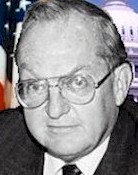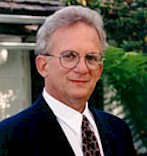
Coble (R-NC)
House Subcommittee Holds Hearing on Compulsory Licensing of
Music on the Internet
May 17, 2001. The House Judiciary Committee's Subcommittee on Courts, the Internet and Intellectual Property held a hearing on music on the Internet. The hearing focused on the availability of music online, the technologies for providing music online, security for copyrighted music, the status of licensing by the various types of rights holders, and recommendations by some that the Congress extend compulsory licensing to music on the Internet.
The hearing was attended by far more Representatives and spectators than other intellectual property related hearings. Twenty members of the Subcommittee, and non members sitting by permission, participated.
 |
|
| Rep. Howard Coble (R-NC) |
Rep. Howard Coble (R-NC), the Chairman of the Subcommittee, presided. He said in his opening statement that "Recent technological developments such as mp3 digital compression, streaming, and peer-to-peer file sharing have provided consumers with easy access to music on the Internet and fueled their interest in using the Internet as a primary way to enjoy music. Yet, this win-win opportunity for both the music industry and consumers has been hampered by services providing free access to unlicenced music, several lawsuits, disputed interpretations of copyright law, difficulty in properly licensing all of the rights, and developing effective means to thwart piracy."
Several witnesses argued that existing laws are complex and archane, that too many permissions are required, that music is not being made available online, and that Congress should therefore pass legislation providing for compulsory licensing for online streaming and downloading of music. In contrast, several other witnesses who represent various types of copyright holders testified that their copyrights are being licensing for the Internet, that technologies (and security for those technologies) is being developed, and Congress should therefore not enact any new legislation.
Robert Glaser, C/CEO of RealNetworks, testified that there are too many types of music publishing rights, and too many holders of these rights, for a negotiated licensing system to allow for online music subscription services to work. He wants Congress to step in and "streamline" the process with a "licensing system that allows for one-stop shopping" through compulsory licensing. See, prepared testimony.
Richard Robins, President of MP3.com, testified in favor of revising the language and implementation of 17 U.S.C. § 115, regarding compulsory licensing. MP3.com provided a music storage service that allowed subscribers to store online their purchased CDs, and then play them back via the Internet. It was sued for copyright infringement, and lost. Robins testified that copyright law should be amended to permit this sort of activity without payment of further fees. He also stated that the Copyright Office should update § 115 licensing procedures to provide that the cable and satellite compulsory license model applies to the "incidental" copying that is integral to Internet transmissions. See, prepared testimony.
Manus Cooney, a VP of Napster, did not testify, but submitted a written statement to the Subcommittee anyway. He wrote that Congress should pass compulsory licensing legislation.
Lyle Lovett, a song writer and performer, testified on behalf of the American Society of Composers, Authors and Publishers. ASCAP licenses the right of nondramatic public performance of its members' copyrighted musical compositions. He stated that "there is not a songwriter I know who opposes new technological ways to perform music. Technology has always been the friend of the songwriter; from piano rolls, to phonographs, to radio's development ... we have looked upon each of these revolutions in communications as new ways to enjoy our music; and, new ways for us to earn a living." He also stated that ASCAP has licensed every Internet user who has requests a license to perform ASCAP music, and that ASCAP has licensed about 2,200 web sites. He concluded, therefore, that "There is no justification for a compulsory license for Internet uses of ASCAP music."
Edgar Bronfman, Executive Vice Chairman of Vivendi Universal, stated that "Universal has invested many tens of millions of dollars in developing a environment for the delivery and enjoyment of digitized music. But a rational, dependable, long-term business plan has two prerequisites. First, we need a strong legal framework to protect our copyrighted music. Second, we need technology solutions that are ready for a global audience. He stated that "The legal framework appears to be in place. The DMCA has done a good job of updating the Copyright Act for the digital age. Importantly, recent court decisions have clearly held that our property rights must be respected." He also stated that Universal is still working on the technology that provides security for copyrighted works. See, prepared statement.
Michael Stoller, a song writer who testified on behalf of the National Music Publishers Association, similarly testified that no new legislation should be passed at this time.
 |
|
| Rep. Howard Berman (D-CA) |
Rep. Howard Berman (D-CA), the ranking Democratic on the Subcommittee, said in his opening statement that music is being made available on line, and that there is no reason to mandate compulsory licensing. He began by observing that "it appears that the supply of online music is beginning to catch up with the demand. While the music industry may have been slow to jump into the online music market, lately the pace of online music deal-making has been dizzying." He cited the creation of Duet by Vivendi Universal, the creation of MusicNet by EMI, BMG, AOL Time Warner and RealNetworks, and other examples.
Rep. Berman continued that "only in extraordinary circumstances, such as demonstrable market breakdowns caused by antitrust violations, does our government require property owners to make their property available to the public at government established rates. Furthermore, copyrights are Constitutionally sanctioned property, and music, despite its emotive power and cultural significance, is basically entertainment." He also stated that "convenience of access to entertainment seems a particularly weak justification for the abridgement of Constitutionally sanctioned property rights. It is especially difficult to justify government interference with property rights when the free market, however fitfully, appears to be moving in the right direction."
Rep. Berman also stated "I am disturbed by the implications of what would essentially be Internet-specific government regulation. ... Any Internet legislation we pass, it is argued, would be outdated before it was enacted, and might run the risk of freezing or stifling technological developments in the Internet sector." He concluded, "I see no need or good reason for sweeping legislation regarding online music."